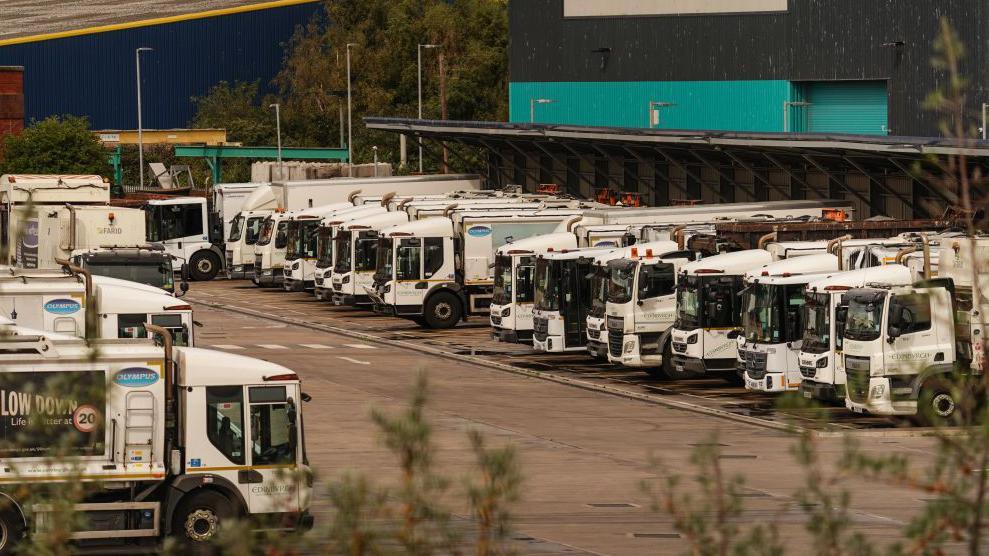Unison members reject latest council pay offer

The unions had warned there would be a repeat of scenes from the summer of 2022, when rubbish piled up on the streets in cities
- Published
Members of Scotland's largest trade union have rejected the latest pay offer for council staff.
Thousands of Unison members (86%), including waste and recycling workers, turned down the offer of a £1,292 per year or 3.6% rise – whichever was higher.
The union was one of three to suspend strikes, alongside the GMB and Unite, days before they were set to go ahead last month.
Finance Secretary Shona Robison said the decision was "very disappointing" while Cosla said the offer was at the absolute limit of affordability for local government and "fully exhausts all available additional funding from Scottish government."
The GMB has already accepted the offer, tabled by local authority governing body Cosla, while Unite is due to give its response later this week.
Unison will decide on its next steps in the coming days, which could include strikes.
The offer includes an hourly uplift of £0.67 or a 3.6% increase, whichever is higher.
However, the union says this falls short of expectations given the 25% real-terms pay cut over the past 14 years, and council workers in Scotland are angry their pay offer is not in line with other public service workers, many of whom have been given 5.5% pay rises.
Union votes to accept bin worker pay deal
- Published29 August 2024
New pay offer in hope of avoiding bin strikes
- Published9 August 2024
Less than 24 hours after the latest offer was made, a freeze on non-essential spending was announced, with First Minister John Swinney saying "tough choices" had to be made.
The government has already confirmed it will need to take money from other areas, such as nature and iPad funds to settle the pay deal.
Unison has mandates for strike action by waste and recycling workers at 13 councils, and for education and early years staff at five councils. Areas that could be affected by bin strikes include:
Clackmannanshire Council
Dumfries & Galloway Council
East Ayrshire Council
East Lothian Council
Fife
Glasgow City Council
Inverclyde Council
Midlothian Council
North Lanarkshire Council
Perth & Kinross Council
South Lanarkshire Council
Stirling Council
West Lothian Council
Unison's local government committee chairperson Colette Hunter said Cosla and the Scottish government needed to understand the anger among council staff.
"They want a fair increase to stop their pay consistently falling behind, and for their wage increase to be in line with other areas of the economy," she said.
“The last thing anyone wants to do is go on strike, but local government workers deserve better."

Finance Secretary Shona Robison said industrial action would serve no-one
Unison Scotland's co-lead for local government David O’Connor added: “Councils are in crisis. They struggle to recruit because workers are expected to deliver even more with fewer staff and lower wages.
"That puts workers and the services they provide under intolerable pressure. It’s unsustainable it can’t go on.”
Staff in 26 of Scotland’s 32 council areas had initially planned to walk out between 14 and 22 August after rejecting two previous Cosla deals.
They had been offered a 3.2% rise, backdated to April.
They warned there would be a repeat of scenes from the summer of 2022, when rubbish piled up on the streets in cities including Edinburgh and Glasgow.
Free iPad scheme suspended to fund Scottish council pay deals
- Published26 August 2024
Nature funding to be used to settle council pay deals
- Published25 August 2024
A Cosla spokesperson said it was "deeply disappointed" to learn that Unison had rejected its "strong" offer, which was above inflation.
"This offer is at the absolute limit of affordability for local government and fully exhausts all available additional funding from Scottish government," they said.
“Local government have a responsibility to ensure sustainable service delivery for our communities across Scotland. We are clear that increasing the value of any pay offer would have very serious consequences.
"We remain concerned that Unison’s expectations cannot be met without further unpalatable difficult decisions."
The spokesperson added that Cosla was aware that communities would be concerned about the potential impact of industrial action on the most vulnerable and urged Unison to reconsider the offer which it emphasised had an overall value of 4.27%.
Finance Secretary Shona Robison said industrial action "will serve no-one" and urged all parties to work together constructively.
She said: "This offer is, once again, better than that made to local government workers in the rest of the UK.
“I am delighted GMB Scotland members have voted in favour of our fair, above-inflation pay offer which allows this hugely valued workforce to continue serving communities. I hope Unite members also recognise the fairness and strength of the offer and will to vote to accept."

Unison’s rejection of the improved pay offer will be a huge disappointment to councils and the Scottish government but it will not be a surprise.
Unison had urged members to turn down the offer which was designed to see off the threat of strikes.
Now there is a real possibility of Unison calling action involving staff working in refuse, recycling, schools and nurseries in several council areas.
One of the other big council unions, the GMB, has voted to accept the offer. The other, Unite, is still consulting its members but is widely expected to accept it too.
Action by Unison alone would not be so disruptive across Scotland as action by two or three unions together.
Unison is concerned the offer does not do enough to address what it sees as the long-term decline in the value of council pay.
And while the offer included significant rises for lower paid staff – especially those at the bottom of the pay scale - it was less generous towards some of those further up it.
It is possible that councils may simply impose the pay offer against Unison’s wishes.
But if a better offer needs to be made to avert a renewed threat of industrial action, where would the money come from?
Councils and the Scottish government both argue they simply don’t have the cash.
More for pay will mean less for something else.